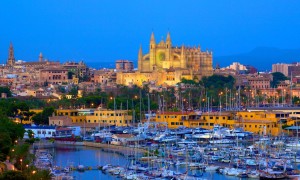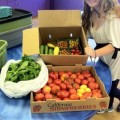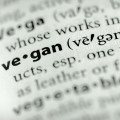 I live on the island of Mallorca, a Spanish island in the middle of the Mediterranean Sea. People here regard themselves as the Chosen Ones when it comes to diet. After all, numerous scientific studies or at least their press accounts have told the whole world that the Mediterranean diet is the winner. For those living around this body of water, this is a source of pride (“we are the best!”) and comfort (“our diet keeps us healthy!”).
I live on the island of Mallorca, a Spanish island in the middle of the Mediterranean Sea. People here regard themselves as the Chosen Ones when it comes to diet. After all, numerous scientific studies or at least their press accounts have told the whole world that the Mediterranean diet is the winner. For those living around this body of water, this is a source of pride (“we are the best!”) and comfort (“our diet keeps us healthy!”).
For those of us who rely on HappyCow to guide us in our foreign travel, these Mediterranean attitudes create particular challenges. Outside of the cosmopolitan Spanish cities like Madrid and Barcelona, finding nutritious, whole food, plant-based menu items is nearly impossible. The most common solution for restaurants to offer is vegetables sautéed in way too much olive oil and salt. Or, they could make you a salad. The only grain one can find is white rice in the traditional paella, and legumes are almost always in a meat sauce.
A lot of media attention has been given to the recent World Health Organization (WHO) study that was bold enough to say something about processed meat and probably red meat causing colorectal cancer. The Mediterraneans are smug about the findings. “These findings are not relevant to us.”
The extranjeros or “foreigners” who thrive on the WHO study’s meats are not real Mediterraneans, even if they live around the Mediterranean Sea. Sausages belong to the Germans. Bacon belongs to the British. And hamburgers…well those of course belong to the Americans.
“We are safe. We eat cordero (mutton) from our grass-fed sheep andternera (beef) from our free-ranging cows. We have a yearly matanza (pig sacrifice) and thriftily use all of the animal, in the way our ancestors did. We save some of the meat for fresh cuts, some for drying, some for salting, and the rich lard for baking our ensaimadas and other pastries. And we clean the intestines so that they can hold the delicious mixture of meat and spices that make up our famous Mallorcan sobrasada.”
In talking to my Mallorcan friends about the WHO findings, I walk a tightrope. When you already know that you follow the Chosen Diet, there is little to learn from a study like that, other than that it does not pertain to you.
But strangely, the study has had traction. There is a sense of unease underneath all of the bravado. People are talking about it. It has been on the front page of the newspapers. Something is happening.
 Before the study came out, my husband David and I were invited to speak to a local Rotary Club about The China Study. The book was translated into Spanish a few years ago, and some of our friends have been influenced by it and have been talking to community leaders about its findings and recommendations. We have had lively discussions about its relevance in the Land of the Chosen Diet.
Before the study came out, my husband David and I were invited to speak to a local Rotary Club about The China Study. The book was translated into Spanish a few years ago, and some of our friends have been influenced by it and have been talking to community leaders about its findings and recommendations. We have had lively discussions about its relevance in the Land of the Chosen Diet.
With our Spanish friends, we decided to embark on a project in which we encourage restaurants to add a few whole food, plant-based items to their menus. Our motivation for this project is almost entirely selfish…we love to spend time with friends, and Spaniards get together mainly to enjoy food in restaurants. We want the restaurants to offer options we can enjoy while our friends dine on their chosen foods.
When you eat in Spain, the great majority of the meal is spent talking about food. In a restaurant, it starts with an animated discussion with the waiter about what food to order. Everybody is in on this, with passionate attention on the freshness of the ingredients, the methods of preparation, and the anticipation of the flavors that are about to be presented to the table. When we ask for guidance on what menu items have no dairy, an uncomfortable interruption occurs in the flow of the conversation. This offers an opportunity to get on that tightrope and take a walk. We have met some brick walls. Yet, we also have found some open doors.
Here are four questions that we have found have opened some doors and yielded some good discussions.
1. Is the Mediterranean diet that you follow the same as the one that your Grandparent’s Grandparents followed?
We don’t even have to go back that many generations to learn that it is not. There is much more animal product in the modern Mediterranean diet than there was in the diets of family members a few generations back. Also, there is a lot more oil, including olive oil. Processed foods did not exist back then. And modern Mediterraneans eat a lot fewer grains, legumes and even vegetables.
2. Does your grocery cart contain different things than the grocery cart of someone living in New York or Berlin or London?
That question is met with a snobby, incredulous “por supuesto! (of course!)” and later followed by conciliatory backtracking. Eventually our consensus is that the majority of what the Spanish grocery cart contains is processed food and animal product, and is likely very similar to grocery carts in other industrialized countries far from the Mediterranean Sea.
3. What did your Grandparents’ Grandparents die from and what do you think you will die from?
“The ancestors died from infectious diseases, childbirth, and death in childhood. The top three reasons modern Spaniards die are heart disease, cancer and respiratory disease.”
4. How can we benefit from the best of both worlds? Living in the 21st century, you are unlikely to die of the things your ancestors died of because of the miracles of modern medicine. If the ancestors survived their childhoods, they had a good chance of living a long, healthy life. What worked for them back then? How can we benefit from those habits and that wisdom so that we can change what we expect will cause us illness and death?
This is when the conversation opens up into interesting territory. We explore what it would be like to eat an ancestor-style Mediterranean diet, based in whole grains, legumes, vegetables, fruits, wine and small amounts of olive oil. With older Spaniards, the conversation becomes nostalgic. They recall that food was prepared in the home with love and attention to tradition. Animals were saved for special occasions, enjoyed during holidays (historically, one of the family’s herd members was sacrificed and used in its entirety). Dairy products were not consumed at every meal, nor were they in every dessert. People consumed much less sugar, and no processed foods.
The China Study showed us that people who live in rural areas with the sort of diet that the Spanish ancestors ate are the ones in modern life who are living the most healthfully.
The United States has offered many more lessons than just hamburger recipes. Americans spend lots more money per person on medical care than do Spaniards and do not have better health…far from it. Increasingly, Spaniards suffer from the very same diseases that plague Americans.
As our Spanish friends continue to make these connections and embrace new ideas, they may take action in their daily lives. The conversations are just beginning. They can now read The China Study in Spanish, and watch Forks Over Knives with Spanish subtitles. And soon, there may be restaurants where they can select a whole food, plant-based meal, which will be featured on HappyCow.
The passion, the love of creating the food, the focus on freshness and on long, lighthearted conversations over delicious meals, these things run deep in Spanish blood, and are among the key ingredients in healthful nourishment. And if Spanish Mediterraneans combine these qualities with a move toward more whole food, plant-based eating, they may truly be able to offer the world a Chosen Diet.
About the author: Kathryn Hayward, M.D. was a primary care internal medicine specialist at the Massachusetts General Hospital and Harvard Medical School for 20 years. She now lives in Mallorca, Spain, where she practices Integrative Health in the United States and elsewhere through Odyssey Journey: A Collaborative Approach to Wellness (www.odysseyjourney.com), and is co-founder of International Integrators (www.internationalintegrators.org), a community devoted to the global promotion of Integrative Health. International Integrators is offering its next immersion retreat in Avila, Spain (www.internationalintegrators.org/immersion-retreat-avila-spain), from June 12-17, 2016. You may find it appealing during that immersion to get hands-on experience cooking whole food, plant-based meals in the kitchen.
Image source: getmetravelled.com






No Comments